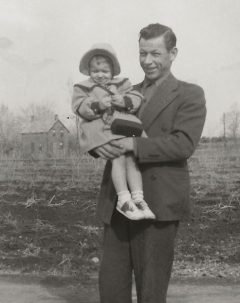
Samantha Maracle with her father Garnett Maracle
By: Laura McCaffrey
Giving Insight Spring 2021 edition
Samantha Maracle (BSc/74) grew up on her family’s farm in the Tyendinaga Mohawk Nation. Her father, Garnett Maracle, was a farmer who acquired several plots of land in Tyendinaga throughout her childhood, including a lakefront cabin that quickly became Samantha’s favourite spot.
She eventually inherited her father’s land and gradually transferred most of it to other Tyendinaga community members. The exception was the lakefront property, which she kept all of her life.
“That property was special to me,” Samantha explains. “But as I don’t have children who could inherit it, I had to decide what to do with it.”
On one of many recent visits to Tyendinaga, Samantha discovered the community was facing a challenge. “I was the only Tyendinaga student in my grade to go university, so I had no problem securing financial support,” she recalls. “When I visited the Tyendinaga Band Office last year, I learned of a new roadblock for students: with hundreds of Tyendinaga youth applying to postsecondary, there are not enough funds to go around.”
A lifelong proponent of education, Samantha decided to transfer ownership of her lakefront property to her cousins, Lisa and Tom Maracle, and use the proceeds to help her community. She worked closely with Carleton to establish the Tyendinaga Mohawk Nation Education Bursary, an endowed award that will provide financial support to youth living on the Tyendinaga territory.
“I knew that I wanted my estate to go back to the Mohawk people of the Bay of Quinte. This is my way of respecting the elders and the land—land that is a part of my father’s legacy. Now that legacy can live on through this endowment,” Samantha shares.
With the endowment now in place, Samantha is directing a share of her estate to the bursary and is committed to working with Carleton and family members to ensure the sustainability of the award.
She explains: “It was important to involve my younger relatives—including my cousins Patti and Lisa and their families—who want to ensure the integrity of the endowment after my death.”
She also hopes the student recipients will feel compelled to continue to support Tyendinaga youth by contributing to the bursary in the future. “As the recipients will all live on the reserve,” she says, “the bursary will be close to their hearts. They will be able to go see the land that enabled them to attend Carleton.”
“The planned giving team at Carleton completely exceeded my expectations: as they helped secure matching funding for my gift,” she shares. “That showed me that Carleton genuinely cares about Indigenous students.
“This endowment is a unique place where we can make legacy gifts honoring the Maracle family and other Mohawk families. Involvement from many people will result in the biggest impact for Tyendinaga youth. If everyone considered future generations and saw the benefits of philanthropy, there would be a more sustainable future for Indigenous students’ education.”